
JULIA LEE BARCLAY-MORTON – YOGA, WATER AND REWRITING AUTISM
I interviewed writer Julia Lee Barclay-Morton about her experience of autism. Julia began as an experimental dramatist in New York, moving to the UK to
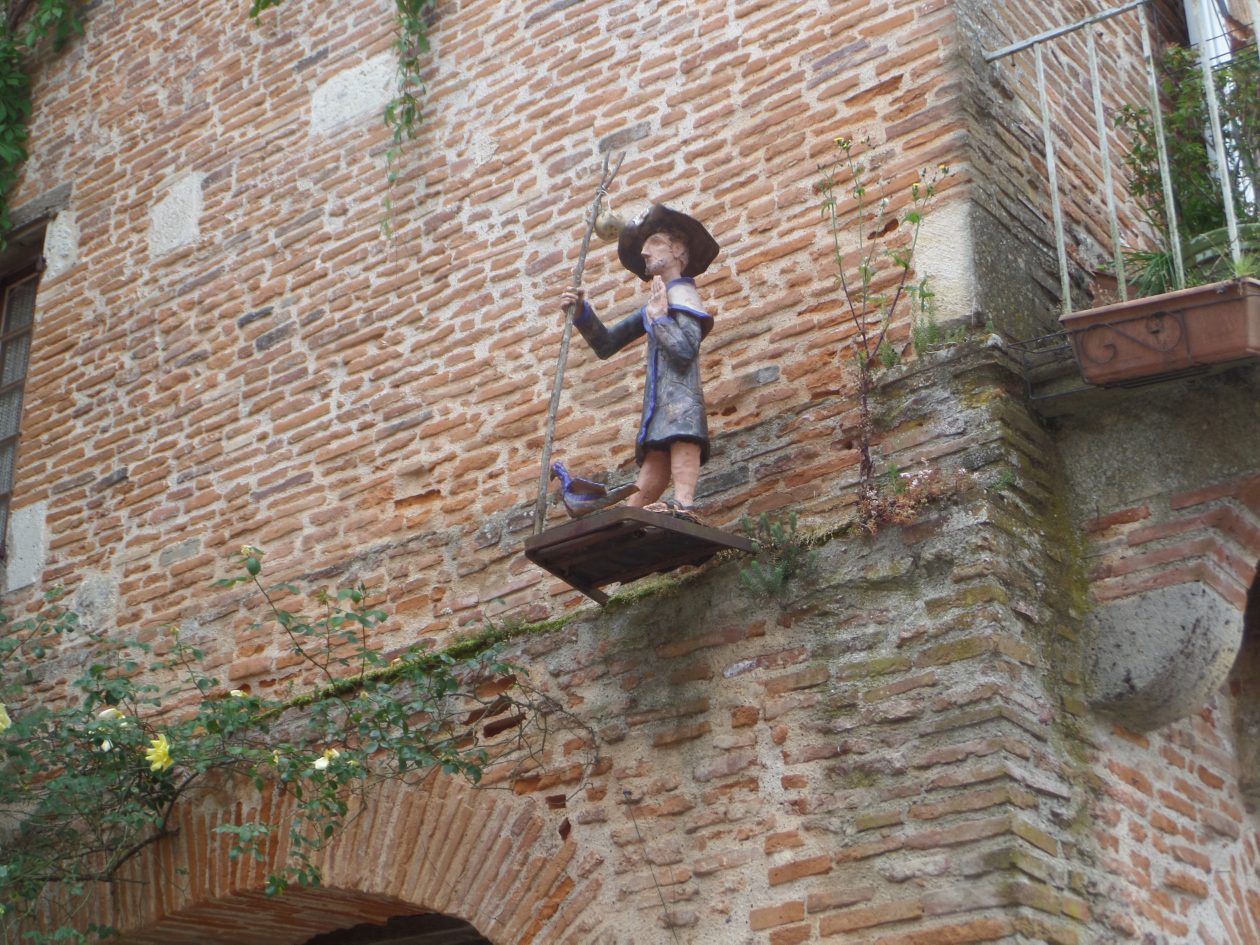
A summary of experiences at Virginia Center for the Creative Art’s 2014 “O Taste and See” workshop by Andrew Dillon.
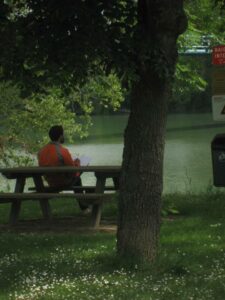
It’s about 2pm in small-town southern France, what feels to me like early spring (although it’s mid-May), and I’m sitting with my back against a picnic table, facing the Garonne, growing frustrated. I’m cold because I only brought one pair of jeans and nothing warmer than a wind-breaker to Europe, but that’s not why I’m irritated. I briefly consider that I’ll never find in Knoxville a rosé better than the one I had with lunch, but that’s not it, either. I try hearing the river flow in this present moment. Just water. I shift forward, crane my neck, and swear. The reason I’m annoyed is that the damn river won’t say anything to me.
Dr. Marilyn Kallet, our literary leader and guide to Auvillar‘s food, wine, flowers, community, and other muses, has instructed us to “let the river answer.” The prompt plays on a line in Leonard Cohen’s ‘Suzanne’. We read other river poems, and one of our group, Deborah Bono, sings the Cohen song. We’re all flushed with inspiration when Marilyn sends us to the Garonne.
Almost all of the participants I talked to noted that working with Marilyn was a strong factor in deciding to attend O Taste and See. Marilyn has written seventeen books, including six poetry collections, and has been leading the workshop in Auvillar since 2009. She’s come to know the people, places, and history of southern France: the George Clooney-look-alike selling cheese at the Valence-d’Agen open-air market, the small stained-glass Chagall nestled into a chapel wall in Moissac’s Abbey of St. Pierre, and the region’s Jewish resistance during World War II.
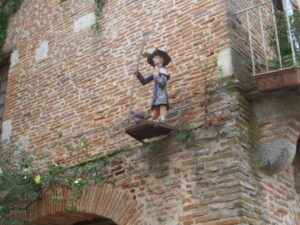
“Poetry is everywhere in Auvillar,” I’ve heard her say many times. And it’s true. It’s in the pilgrims scattered around town—both human, passing through on the Camino de Santiago pilgrimage route, and sculpted, lining the buildings along the grain market; it’s in the hands of our chef, Fatya, holding them to her throat like you might clasp a pendant, before each meal while saying in English, “Okay, you can eat now”; and yes, it’s in the river.
The whole group is wandering the banks: ten poets, some of whom are still in college and some of whom have multiple books and grants to their names, and one award-winning photographer, husband to one of the poets. By now, I’m kneeling on a slipway, leaning over the river, my head cocked toward the bridge to Espalais, holding my ear about eight inches from the filthy water. All I can hear are the reed frogs, which sound to me like dolphins chirping. It occurs to me that Marilyn didn’t tell us to listen to the river—she told us to let it answer. I don’t know what to tell the river, but the Cohen song does remind me of Darrell Scott’s, “For Suzanne.” So that’s what I sing. And then the Garonne gives me a poem.
I received a work-study scholarship to attend O Taste and See. Before and after most meals, I helped Fatya set and clear the table and wash the dishes, and each morning, I went to the gîte that housed about half of our participants to set out coffee, yogurt, and fresh croissants. After everyone left, I stayed back a few minutes to clean before walking to our studio, Le Moulin à Nef. (Le Moulin à Nef, by the way, is not a name people in town recognize. It means “flour mill,” and there hasn’t been a mill since the mid-nineteenth century.)
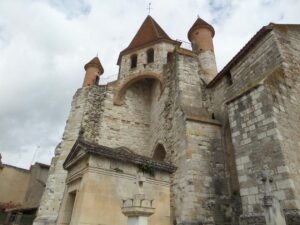
In retrospect, this walk might have been my favorite daily activity; going back toward the center of town, the tower of the Church of St. Peter rises over every building and tree. It is a religious experience, even for me, who renounced his Catholicism fifteen years ago. It reminds me of my maternal grandfather, who was a Captain in the Knights of St. John. While visiting the abbey in Moissac, I donate, light a votive candle, and say a prayer for him—the only time I’ve prayed in my adult life. This air of divinity presides over every quiet moment in Auvillar, if you’re open to it. Poetry is in everything here.
This reverence of place is common, based on the testimony of other participants. KB Ballentine reflects on the collective experience:
“Surrounded by an unfamiliar language, gardens and a wonderfully wide river with a ‘history’ injected my writing with new subtleties […]. The town, the people, the opportunity to share new work with a non-judgmental audience, wandering the marketplaces and visiting the various sites—all of these were priceless.”
The river looms in all of our minds. We heard some of its mythos, like the stories of women who threw in scraps of paper scribbled with the names of the lovers who abandoned them, hoping it would carry their sorrow away. For some, like Claire Dodson, the association is more direct: “I can still picture everything from Auvillar […] I can vividly hear the water in La Garonne and the endless frogs.”
Some left with an awareness of the poetry that is always around them—the poetry of the everyday.
“I stop and observe my environment more often, and my improved observation skills during mundane life has directly influenced my poetry.” -Jenny Price
“Many of the things we say in regular discourse can become the seeds of poetry.” – Deborah Bono
Others came home with a greater command of their own poetic voice.
“The poems I wrote in Auvillar carried ‘a bolder voice’ than those I wrote at home.” – Helga Kidder
“I gained more confidence in my writing. I had been expecting to write more scientifically for my honors thesis idea, but after Auvillar, it made me look at my project more intimately. Writing poems became more personal for me.” -Jenny Price
“I really enjoyed my shadow poem […]. I don’t think I would have written it if I hadn’t gone there. It really opened up my poetry and helped me be more vulnerable in future work.” – Claire Dodson
The shadow poem refers to a prompt Marilyn gave us—to write a poem that scares us; or, as she sometimes phrases it, “the poem that you have censored in yourself.” Similar to Claire, writing the shadow poem has permanently altered my voice and the scope of what I am prepared to reveal in my poetry. It scared me so much after I finished it, that I couldn’t share it with the group, only with Marilyn.
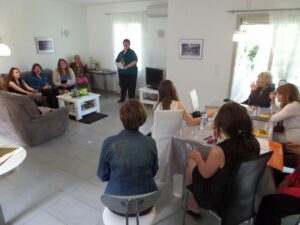
Eventually, though, after several months of living with the poem, I was able to perform it at a joint reading as part of the University of Tennessee’s Sex Week 2015. It’s a poem utterly concerned with my life, but I don’t think I could have written it in the U.S., or ever would have given myself permission to. Being in France, though, with the support of our small group, broke new poetic ground for myself. KB phrases it concisely: “The varied exercises and working with a talented group of writers also enabled me to go to another level. I think long-term this has changed me.”
Since I began the final year of my Master of Fine Arts in August 2013, I have been working full time as a technical writer. Somehow, I wrote more in those final two semesters—while working, teaching & grading, and taking classes—than I do now when my only real commitment is forty hours per week at the office. My best guess is that’s because while I was in school, I interacted with a community of writers every day. We gave and received feedback on each other’s writing, attended readings or read for each other, exchanged ideas about writers and theory, or just drank whiskey together. There’s something about simply being in the presence of writers that elicits more writing.
And that is why I think what VCCA offers with O Taste and See is so valuable. The program gives you an opportunity to be a writer amid your life’s responsibilities that would otherwise dominate your waking hours. VCCA says, “Here, we give you permission to do nothing but write poems this week.” (While, of course, providing food that is itself art, and wine to spark your creative energy.)
Without my time at O Taste and See, I would have gone straight from defending my thesis to spending every weekday, 8am–5pm, in a cube under fluorescent lights. I wouldn’t have written poems that challenged me to step outside my established voice and subjects; I wouldn’t have written a poem that scared me so much that when I finally came to terms with it, I knew I had to start writing poems beyond myself and my experience. I wouldn’t have learned how to look at those old subjects with new eyes, rediscovering the body that incited me to write poetry in the first place. And in the end, that is the most salient takeaway for any writer, one shared by all respondents—the experience is transformative.
“After I left Auvillar, I felt like I could maybe call myself a ‘poet.'” – Claire Dodson
“It has been a great blessing.” – KB Ballentine
The water may rise sharply
When I let the river answer…
I guess the Garonne would choose Darrell Scott’s voice and sing,
“I got this feelin this won’t be the same”
—if I could get that bastard to answer.
I tried to crouch over the bank and dunk my head to my ears.
I tried to cup the river like a first communion.
I tried to rinse off deodorant and old sex,
but only heard the frogs chirping like dolphins.
A pilgrim stopped and asked, Que-ce que vous-faites îci? What are you doing here?
“Ecrire… poetry,” I said.
Comprend pas. I don’t understand.
Vous chantez? You’re singing?
To get the river to speak, I had to sing
“She’s been sleepin it off,
but some day she’ll come to”
and it told me:
You’re both made of water, which may rise sharply at any time.
After the flood, life will teem from every crevice
So drink.
Andrew Dillon
You can read more poems by Andrew Dillon here:
Two Poems in Review Americana.
Three poems in Connotation Press.
ABOUT LESLIE TATE’S BOOKS:

I interviewed writer Julia Lee Barclay-Morton about her experience of autism. Julia began as an experimental dramatist in New York, moving to the UK to

I interviewed Gillean McDougall from Glasgow, who edited the collaborative projects Honest Error (on Charles Rennie Mackintosh and his wife Margaret Macdonald) and Writing the

I interviewed French writer Delphine de Vigan, whose book, No et moi, won the prestigious Prix des libraires. Other books of hers have won a clutch

I interviewed Joanne Limburg whose poetry collection Feminismo was shortlisted for the Forward Prize for Best First Collection; another collection, Paraphernalia, was a Poetry Book Society Recommendation. Joanne

I interviewed Katherine Magnoli about The Adventures of KatGirl, her book about a wheelchair heroine, and Katherine’s journey from low self-esteem into authorial/radio success and
| Cookie | Duration | Description |
|---|---|---|
| cookielawinfo-checkbox-analytics | 11 months | This cookie is set by GDPR Cookie Consent plugin. The cookie is used to store the user consent for the cookies in the category "Analytics". |
| cookielawinfo-checkbox-functional | 11 months | The cookie is set by GDPR cookie consent to record the user consent for the cookies in the category "Functional". |
| cookielawinfo-checkbox-necessary | 11 months | This cookie is set by GDPR Cookie Consent plugin. The cookies is used to store the user consent for the cookies in the category "Necessary". |
| cookielawinfo-checkbox-others | 11 months | This cookie is set by GDPR Cookie Consent plugin. The cookie is used to store the user consent for the cookies in the category "Other. |
| cookielawinfo-checkbox-performance | 11 months | This cookie is set by GDPR Cookie Consent plugin. The cookie is used to store the user consent for the cookies in the category "Performance". |
| viewed_cookie_policy | 11 months | The cookie is set by the GDPR Cookie Consent plugin and is used to store whether or not user has consented to the use of cookies. It does not store any personal data. |